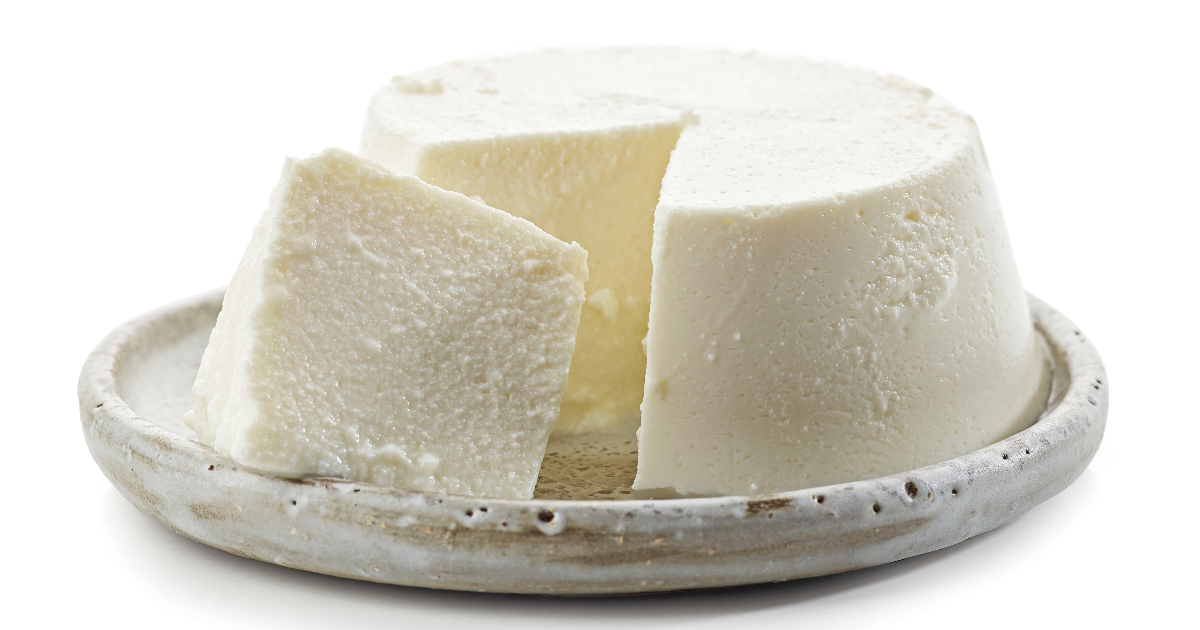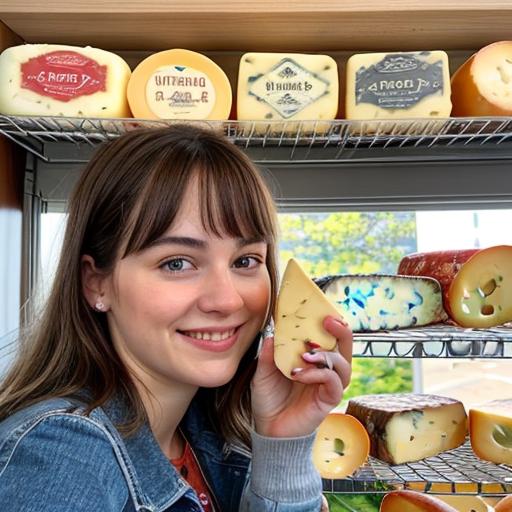Basket cheese and ricotta are two fresh Italian cheeses with similarities, but also some key differences.

Though they can be used interchangeably in some recipes, each cheese has its own unique properties.
Overview Of Basket Cheese Vs. Ricotta
Basket cheese and ricotta have some broad similarities:
- Both are fresh Italian cheeses that are not aged.
- They have a mild, delicate flavor compared to aged cheeses.
- Traditionally made from cow's milk. Sometimes sheep or goat's milk is used too.
- Have a creamy, moist texture when fresh.
- Widely used in Italian cuisine, especially Easter recipes and savory pies.
However, they also have distinct differences when it comes to:
- Production methods
- Texture
- Taste
- Traditional uses
- Nutrition profile
While ricotta has more worldwide popularity today, basket cheese holds an important place in Italian culture and cuisine.
Below we'll explore what sets these two cheeses apart.
Key Takeaway: Basket cheese and ricotta are both fresh, unripened Italian cheeses. Basket cheese is molded in a basket, giving it a woven texture. Ricotta is made from whey leftover from cheesemaking.
Origins and History
Basket Cheese
- Originally hails from the Middle East and Mediterranean regions.
- Called sepet peyniri in Turkish. Closely associated with seaside Turkish towns.
- Referred to as kelle peyniri when made from sheep's milk.
- Woven basket mold leaves distinctive marks on the cheese.
- Has been produced in Italy for centuries.
Ricotta
- Has roots in Italian cuisine dating back to medieval times or earlier.
- The name "ricotta" literally means "re-cooked" in Italian.
- Made from the whey leftover after producing other cheeses. Whey is re-cooked to make ricotta.
- Efficient way to use excess whey rather than waste it.
- No molds used - simply drained in a basket or cloth.
So basket cheese production techniques tie to its name and origins, while ricotta emerges as a clever solution for whey byproduct.
Ingredients
Basket Cheese
- Cow's milk is traditional, sometimes mixed with sheep's or goat's milk.
- Rennet is typically used to coagulate the milk.
- Salt is added to make a drier, salty version. Fresh basket cheese has no salt.
Ricotta
- Made from the whey drained from other cheeses.
- No rennet needed since whey is already separated.
- Acid like vinegar or lemon juice is added to coagulate proteins.
- Salt is usually not added so ricotta stays mild and slightly sweet.
The biggest difference is that basket cheese uses fresh whole milk, while ricotta re-purposes whey. Rennet is key for basket cheese and acid for ricotta.
Production and Process
Basket Cheese
- Warm milk and add rennet to coagulate curds.
- Cut curds and let stand to further separate curds and whey.
- Drain in a woven basket mold to shape the cheese.
- Lightly press to remove more whey.
- Optionally, salt the cheese for a drier texture.
Ricotta
- Collect whey drained from other cheeses.
- Re-heat whey nearly to a boil.
- Add an acid like vinegar to coagulate proteins.
- Curds form and rise to the surface.
- Gather curds in a basket or cloth to drain.
- Do not press - leave ricotta moist.
So basket cheese follows a more standard cheesemaking process using rennet and a mold. Ricotta uniquely re-purposes liquid whey into curds using heat and acidity.
Texture
- Basket cheese - Smooth, semi-soft, creamy, moist. Rubbery when fresh.
- Ricotta - Very soft, moist, porous, slightly grainy. Almost crumbly when disturbed.
Basket cheese has a more rubbery, elastic texture similar to mozzarella. Ricotta is looser and more delicate.
These textures lend themselves to different culinary uses outlined later.
Flavor
- Basket cheese - Mild, subtle flavor. Slightly salty if a salted version.
- Ricotta - Mild, delicate, slightly sweet flavor due to lactose in whey. No salt added.
Both cheeses are relatively neutral in flavor. But ricotta's sweetness makes it ideal for desserts.
Uses
- Basket cheese
- Eaten fresh or melted
- Easter pies
- Pizza
- Pastas
- Savory dishes
- Ricotta
- Lasagna and baked pastas
- Cheesecakes and cannolis
- Pancakes or crepes
- Dips and spreads
- Italian desserts
While both work great in savory dishes, ricotta's sweetness makes it the choice for desserts.
Basket cheese melts evenly for pizza or pasta. Ricotta becomes creamy when heated but can curdle if overcooked.
Nutrition
Per 1 oz serving
| Basket Cheese | Ricotta |
|---|---|
| Calories 80-90 | Calories 180 |
| Fat 7g | Fat 14g |
| Carbs 1g | Carbs 3g |
| Protein 5g | Protein 11g |
So ricotta contains nearly double the calories, fat, and protein compared to basket cheese in an equal serving.
Ricotta offers more nutrition given its production from protein-rich whey. But basket cheese makes a lighter option.
Price
- Basket cheese - $12 to $18 per pound
- Ricotta - $4 to $12 per pound
Being more niche, artisanal, and labor intensive, basket cheese comes at a premium price compared to mass produced ricotta.
Appearance
- Basket cheese - White color. Woven pattern on surface. Round or basket mold shape.
- Ricotta - White color. Smooth, uniform texture. Sold as a block, spoonable tub, or individual cups.
The woven basket texture gives basket cheese a unique, aesthetically pleasing appearance.
Taste Comparison
To summarize the flavor differences:
- Basket cheese - Mild milky flavor, slightly rubbery and salty fresh. Slightly firmer than ricotta.
- Ricotta - Mild milky flavor, no salt. Fine, crumbly curd texture. Slight sweetness.
Think of basket cheese as an unsalted mozzarella and ricotta as a fluffy, less-dense cottage cheese.
Substitutes
- For basket cheese - Fresh mozzarella, feta, paneer, queso fresco
- For ricotta - Cottage cheese, mascarpone, creme fraiche, Neufchatel
Substitutes share similar textures and neutral flavors. Feta adds saltiness reminiscent of basket cheese. Cottage cheese mimics ricotta's crumbly curds.
Storage
- Refrigerate both cheeses.
- Maintain high moisture so they don't dry out.
- Use within 1-2 weeks for peak freshness.
- Basket cheese can freeze well for longer storage.
Proper storage preserves freshness and prevents undesirable bacterial growth.
Key Differences
| Basket Cheese | Ricotta |
|---|---|
| Origins from Mediterranean and Middle East | Origins in Italian cuisine |
| Made from fresh milk and rennet | Made by recooking whey |
| Salted versions available | Never salted |
| Smooth, rubbery texture | Fine, crumbly curds |
| Mild, slightly salty flavor | Mild, slightly sweet flavor |
| Used in savory dishes and Easter pies | Used in desserts like cheesecake |
| More expensive artisanal cheese | Mass produced, affordable |
| Woven pattern on surface | Smooth, uniform texture |
Key Takeaway: While similar fresh Italian cheeses, basket cheese and ricotta differ in ingredients, texture, taste, uses, price, and appearance.
FAQs
Can you freeze basket cheese and ricotta?
Yes, both basket cheese and ricotta can be frozen to extend their shelf life. However, freezing may slightly alter their texture once thawed. Properly wrap them first in plastic wrap or aluminum foil, removing excess air. Thaw in the refrigerator before use.
Is basket cheese or ricotta healthier?
Ricotta has more protein, calcium, and other nutrients since it's made from protein-rich whey. But basket cheese is lower in fat and calories per serving. So they both offer nutrition in different ways.
What milk is used to make basket cheese and ricotta?
Basket cheese is traditionally made from cow's milk, sometimes mixed with sheep's or goat's milk too. Ricotta begins with whey left over from cow, goat, or sheep milk cheeses. But both can be made from any of the three types of milk.
Can you substitute basket cheese for ricotta or vice versa?
Yes, basket cheese and ricotta can substitute for one another in recipes depending on the texture and flavor you desire. Just keep in mind that ricotta has a lighter, crumbly texture that may react differently when baked or heated.
Conclusion
Basket cheese and ricotta share an origin as Italian fresh cheeses, but have unique characteristics. While ricotta is more widely available today, basket cheese offers artisanal quality and a signature appearance. Their subtle flavor differences give them distinct culinary roles.
Both cheeses reflect centuries of Italian cheesemaking tradition.
basket cheese molds its delicate curds into a woven basket, imprinting texture and absorbing slight saltiness.
Ricotta gives new life to whey, coagulating proteins through heat and acidity for its airy, crumbly curds.

